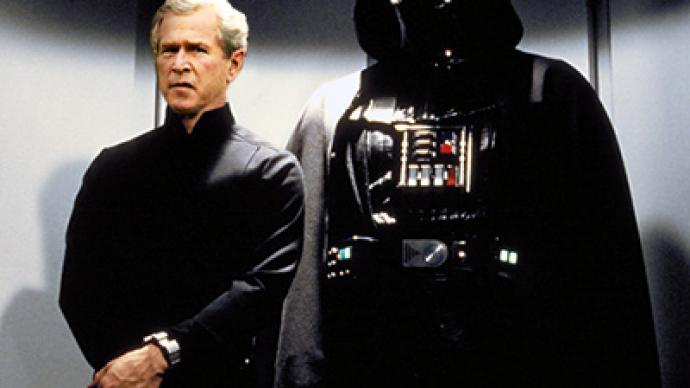Bush confronts Darth Vader, rapper and other demons in memoirs

If only every American president would take the role of leading their country as seriously as scribbling their political memoirs.
George W. Bush was often criticized for the number of vacation days he racked up during his two-term presidency. According to one report, the 43rd president spent 487 days camped out at Camp David, the presidential retreat, and another 490 days at his Crawford ranch. How many other days were spent in sober reflection of the monumental duties that lay before him would be mere speculation.Yet there is a studious side to the former American president after all. Following his painful, slow-motion tumble from power, which saw even the reddest states finally throw up their arms in exasperation, Bush isolated himself from the public for two lonely years. In that time, he set about dictating his presidential memoirs, entitled “Decision Points,” a 500-page brick for fans and critics alike.The length of this political autobiography could be due to the fact that no other former US president has more explaining to do than George W. Bush. Indeed, three of the most momentous events in modern American history came to pass on this man’s watch: 9/11, Katrina and the Afghanistan-Iraq Wars.
Perfect timing
First, when considering Bush's memoirs it is important to remember the historical context. After all, the US Republicans, unlike the bumbling Democrats, don’t do anything by accident; there is no such thing as coincidence for these power-hungry predators. Or to paraphrase the inimitable Will Rogers: “I am not a member of any organized political party. I am a Democrat.”Thus, it was no coincidence that Bush’s much-hyped book party occurred on the very eve of the mega-decisive midterm elections, which, incidentally, gave US President Barack Obama and his lackadaisical liberals a much-deserved lashing.The timing for the release of Bush’s memoirs proved critical for several reasons. First, Dubya has a peculiar way of attracting an outpouring of public sympathy. The American people have a soft spot in their heads for leaders who habitually mangle verb tenses and forget what capital city they may happen to be visiting at any particular time. Most of us happily relate to these all-too human moments.Bush’s book handlers, however, were smart enough not to release the entire shipment until after the midterm elections were safely in the rearview mirror. By giving the book a limited sneak preview, the Republicans revealed just enough behind-the-scenes stuff about Bush to inspire some sort of sympathy, yet not enough to incur the old wrath of the Republican base. This peek-a-boo strategy, which has Karl Roves’ fingerprints all over it, seems to have worked.Thus, we learn in early reviews of the book – and on the same day as the midterm elections – that Bush (actually!) considered dumping Vice President Dick Cheney from his 2004 reelection campaign in order to eliminate the nagging suspicion that the veteran Washington insider was the one really calling the shots.It was not Bush, however, who had the nerve to confront “Darth Vader” on the matter, but rather the evil Darth Vader who brought up the suggestion to Bush that he [Cheney] be sacked.“I did consider the offer,” Bush writes, acknowledging that Cheney introduced the topic during one of their weekly lunches. “While Dick helped with important parts of our base, he had become a lightning rod for criticism from the media and the left.” “He was seen as dark and heartless – the Darth Vader of the administration,” the former president recalls.Bush resented the idea that Cheney was thought to be the force that controlled the White House.“Accepting Dick’s offer would be one way to demonstrate that I was in charge,” Bush writes.Yet in almost the same breath, Bush relates how Cheney practically challenged the president’s cowboy credentials in the run-up to the Iraq war by asking: “Are you going to take care of this guy [Saddam Hussein], or not?” The one issue where Bush and Cheney seem to have clashed light sabers involved what to do with I. Lewis “Scooter” Libby, the guy who took the fall over the outing of a CIA agent’s identity.When Bush decided against giving Libby a presidential pardon, Cheney upbraided him in private. “I can’t believe you’re going to leave a soldier on the battlefield,” the vice president told him.“The comment stung,” Bush writes. “In eight years, I had never seen Dick like this, or even close to it.”Whether or not this is the stuff of good leadership qualities is left to the reader’s better judgment. However, Bush never seems to have considered that it would have been the mark of a true leader if he had been the one to suggest to Cheney that he (Cheney) seek an early retirement, as opposed to Cheney being the first to broach the subject.In other words, Bush merely acted on Cheney’s “decision” to tender his resignation to help the party. It is too easy to imagine Bush brushing aside the suggestion with a laugh.The failure to remove individuals from positions of power despite massive failures was one of the more unfortunate features of the Bush administration.In the aftermath of 9/11, for example, when the US Air Force remained inexplicably land-locked for 90 solid minutes as lumbering hijacked commercial jets roared overhead, not a single military or civilian official lost their jobs, which would have been the normal procedure.At the very least, firing a half dozen officials, guilty or not for dereliction of duty, would have aggrandized the reputation of the president, and with it, the White House. Ditto for Hurricane Katrina and the hugely unpopular Iraq War, in which not a single weapon of mass destruction was ever unearthed. It would be fair to add that Bush writes in his book that "No one was more shocked or angry than I was when we didn't find the weapons. I had a sickening feeling every time I thought about it. I still do."Such repeated failures, however, eventually became a load that the president was forced to carry alone. Bush’s top advisors failed their leader by not placing a large pad of pink slips on his desk, strongly advising that he use them up by dinner. That way, his minion’s heads would have rolled, instead of his own.A perfect example of solid job security in the Bush presidency is provided by Donald Rumsfeld, the whimsical defense secretary, who managed to hold onto his position even after the outrages of Abu Ghraib, Guantanamo Bay and CIA rendition flights from certain European countries had grabbed international headlines.As Time magazine reported on Rummy’s eventual retirement in November 2006, after much of the damage was already done:“It's not a surprise that Rumsfeld finally resigned…What is surprising is how long it took. Well before the Army Times and Marine Times called for his resignation…the brash Secretary of Defense had lost almost all his allies inside the White House. Just the mention of his name would cause aides to the President to grind their teeth and roll their eyes. He had become a liability to the President, and his advisers knew it and resented it. If the choice had been theirs, Rummy would have been shown the door months, if not years, ago.”The conclusion the article makes is telling today: “That Bush didn't act sooner [to force out Rumsfeld] was politically foolish. Far more seriously, by waiting so long he let his pride get in the way of a much-needed change in Iraq policy. That mistake didn't just cost the Republicans seats in the Congress. It may have cost lives.”
Then Katrina comes marching in
Bush’s memories of Hurricane Katrina and the death and destruction it inflicted upon New Orleans comprise one of the 14 decisions the former president analyzes in his memoirs.Bush candidly acknowledges that he did not respond as effectively to the disaster as he should have.“I should have recognized the deficiencies sooner and intervened faster,” he writes. “I prided myself on my ability to make crisp and effective decisions. Yet in the days after Katrina, that didn’t happen. The problem was not that I made the wrong decisions. It was that I took too long to decide.”Indeed, the ill-advised photograph of the Republican president staring out the window of Air Force One, watching from a safe altitude the massive damage left by Katrina below, created the impression of a leader very much “detached” from the brutal realities on the ground.Nor does it reflect positively on Bush that he failed to learn from the mistake of his own father, George H.W. Bush, who was also criticized for “being out of touch” with the public.“I made an additional mistake by failing to adequately communicate my concern for the victims of Katrina,” he writes. “This was a problem of perception, not reality. My heart broke at the sight of helpless people trapped on their rooftops waiting to be rescued.”Yet despite the tragic scene below, Bush failed to command the pilot to land the plane to make one of those decisive photographs that could have totally changed the public’s perception on the way he handled the hurricane and the devastating floods that followed.The ex-president then had something of a Taylor Swift moment when he admitted that the “worst moment of my presidency” was when rap star Kanye West pronounced on television at the height of the Katrina catastrophe: "George Bush doesn't care about black people."“Five years later, I can barely write these words without feeling disgusted. I am deeply insulted by the suggestion that we allowed American citizens to suffer because they were black… The more I thought about it, the angrier I felt. I was raised to believe that racism was one of the greatest evils in society," Bush writes. "I faced a lot of criticism as president. I didn't like hearing people claim I had lied about Iraq's weapons of mass destruction or cut taxes to benefit the rich. But the suggestion that I was a racist, because of the response to Katrina, represented an all-time low. I told Laura at the time that it was the worst moment of my presidency. I feel the same way today.”Perhaps the invisible thread that connects the Republican Party and the Democrats is that both George W. Bush and his predecessor Barack Obama have been haunted by the ranting of a simple rapper (Obama called West a "jackass" after the rapper stole the spotlight from singer Taylor West during an award's ceremony). It would be hard to imagine any American leader from just 50 years past, in an age when the cult of celebrity and entertainment was not the 24/7 monster it is today, giving any attention to such ramblings.Yet today we have two politicians, from two increasingly indistinguishable parties, wasting tax payer time and money pondering over the utterances of a lone rapper. This may be a fitting metaphor for modern American politics, obsessed as it is with pandering to public opinion, instead of occasionally leading. Indeed, incessant campaigning and mudslinging, as opposed to responsible leading, has become the primary role of every politician.Never before have words become so expensive, yet at the very same time so darn cheap.Bush’s book is available from Crown Publishers for $35 dollars.













